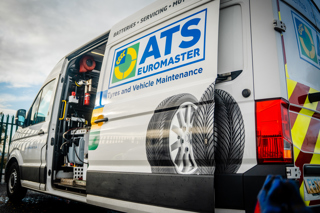Let’s remove the elephant from the room. Ever since Lex Autolease was created by the merger of Lloyds Autolease and Lex Vehicle Leasing in 2009, naysayers have sniped that parent Lloyds Bank plc would not continue to support the business with long-term investment.
Profits couldn’t match those of its retail operations, they claimed. And the gossiping amplified as the operation’s funded fleet size shrank significantly over the subsequent three years, from 360,000 to a low of 268,000 in 2012.
Those same industry commentators started to quieten as the funded fleet recovered to hit a peak of 387,000 in 2018. And they shut up altogether when Lloyds added to its leasing portfolio by acquiring salary sacrifice expert Tusker in February 2023.
The figures tell their own story. Lloyds was vocal about allowing Tusker to “do its own thing, helping the product to flourish”, said Lex Autolease commercial director Paul Hyne.
Its fleet has mushroomed by more than 160% since the acquisition, from a little over 22,000 to almost 65,000 today. By the end of this year, it is forecast to exceed 75,000.

Kit Wisdom, Tusker managing director (pictured above), said: “It’s gone really well; everything has carried on as we said. The relationship has allowed us to grow our talent internally and our customer base. It’s given us the best possible framework for growth.”
Let’s remove the elephant from the room. Ever since Lex Autolease was created by the merger of Lloyds Autolease and Lex Vehicle Leasing in 2009, naysayers have sniped that parent Lloyds Bank plc would not continue to support the business with long-term investment.
Profits couldn’t match those of its retail operations, they claimed. And the gossiping amplified as the operation’s funded fleet size shrank significantly over the subsequent three years, from 360,000 to a low of 268,000 in 2012.
Those same industry commentators started to quieten as the funded fleet recovered to hit a peak of 387,000 in 2018. And they shut up altogether when Lloyds added to its leasing portfolio by acquiring salary sacrifice expert Tusker in February 2023.
The figures tell their own story. Lloyds was vocal about allowing Tusker to “do its own thing, helping the product to flourish”, said Lex Autolease commercial director Paul Hyne.
Its fleet has mushroomed by more than 160% since the acquisition, from a little over 22,000 to almost 65,000 today. By the end of this year, it is forecast to exceed 75,000.

Kit Wisdom, Tusker managing director (pictured above), said: “It’s gone really well; everything has carried on as we said. The relationship has allowed us to grow our talent internally and our customer base. It’s given us the best possible framework for growth.”
Tusker is now the designated salary sacrifice division for Lex Autolease (“it’s a better product,” said Hyne); no new business will be written by Lex, and its existing customers are starting to transition across, including the 3,500 employees at Lloyds.
However, while Tusker has indisputably thrived since the acquisition, Lex’s own fleet has dropped following its 2018 peak, to 281,286 in last year’s FN50 – split roughly 75:25 cars to vans. And in 2023, its 15-year spell as the UK’s biggest leasing company came abruptly to an end as newly merged ALD and LeasePlan (now Ayvens), bounded to number one.
Nevertheless, the money now being invested in new apps, tools, AI modelling and people strongly suggests that both Lex Autolease and Tusker, which retains its own management unit, are firmly interwoven into the Lloyds empire.
Hyne and Wisdom are principal players on the leadership team, alongside Black Horse consumer director Preston Rogers.
Vans are growth priority
Referencing the reduction in fleet size which, at the time of writing, now sits at 275,000 vehicles, Hyne said: “Because of the success with Tusker, we took the decision to manage our residual value risk by reducing our activity in the broker market. Some of that business has been de-fleeted which will protect margins.”
As many as 70,000 vans have been “lost due to a lack of focus”, he added. “A chunk of it was broker and some also went to the bank as asset funding. But we can win any lost business back. Vans is a priority for growth.”
Lex Autolease can point to a successful track record with its closest customers, such as Balfour Beatty which continues to outsource its 6,500 cars and vans to the company in a decade-long partnership.
“We are doing a strategic review on how we structure for success and that will clarify our way forward,” Hyne said. “The refresh will be introduced mid-summer.”
He has already set the business on a “back to basics mission”, with an objective of being “a great fleet management company”.
“Our primary focus is to make customers happy,” he added.
One decision that has already been taken is to outsource some of its fleet management services, such as rental to Nexus and accident management to FMG.
“This is a step change; Lex has not done this historically,” Hyne said. “We want to be as good as we can be, and that means not assuming that we should always do everything. We are using people who are experts in their field.”
Pre-loved cars
Ownership by Lloyds has benefited Tusker in multiple ways, including paving the way for the launch of its pre-loved salary sacrifice cars and the introduction of longer lease contracts.
Lex Autolease started trialling second life leasing a year ago with corporates, building knowledge such as the importance of providing accurate descriptions on wear and tear. It has now rolled out the offering to retail customers via PCH, and that has given Tusker the confidence to add it to its own portfolio.
Pre-loved is already available to 64% of Tusker’s customer base, with the remainder due to be given access over the coming months. Cars are, on average, 26 months old and can be leased for any term or mileage up to 48 months.
They are typically 10-20% cheaper to lease than a comparable new sal/sac car. Take up already accounts for around 8-10% of contracts where offered.
Across the business, Hyne expects to hit five figures this year and to double that in 2026.
“It’s a fundamental offering that broadens our EV availability to as many people as possible,” he said.
Tusker also launched 54- and 60-month salary sacrifice contracts last year, again relying on the knowledge and intel built up by Lex Autolease.
Wisdom explained: “It’s been enabled by the wider group. We didn’t have the residual value data for 60-month contracts; Lex did.”
He added: “These longer contracts now account for around 10% of our order take. It’s an important offering – it’s 6% cheaper than a 48-month contract so for a basic rate taxpayer it’s a fundamental pillar.”
Tusker now has three channel solutions for customers, all available on the same platform: factory-built cars, stock/pipeline cars and pre-loved.
Funding one in eight electric cars
The Lex/Tusker combined funded fleet of 340,000 vehicles is now large enough to retake top spot in the FN50, should Lloyds decide to submit a group figure.
It already goes to market as a complete fleet management and funding solution, with referrals going both ways - last year around a quarter of Tusker’s new driver uptake came from group referrals.
Bundle in all the retail leases via the wider business, and Lloyds Banking Group funds around one in eight BEV and PHEV cars on UK roads – 230,000 BEVs and 75,000 PHEVs on its live financed fleet.
Lex alone funds more than 80,000, 39% of its car fleet, plus another 45,000 PHEVs (22%), while Tusker’s fleet is, unsurprisingly, dominated by full electric – c52,000/80%, versus PHEV at c8,400/13%. That does leave some ICE cars, which Wisdom says are “important for basic rate taxpayers and those for whom BEV doesn’t work, for example no driveway for home charging”.
The BEV stats are even more impressive on forward orders, with Lex reporting 60-75% are full electric, depending on the customer.
“We have a target of reducing our funded fleet emissions by 50% by 2030 on a 2018 benchline,” said Hyne. “Cars are close, but vans still have some way to go.”
AI tool models van use
For those more problematic light commercials, telematics analytics is playing a crucial role in supporting customers’ aspirations. Hyne’s advice is to “just start with one van if necessary; you don’t have to do everything in one go”.
Lex Autolease supports van trials to give customers the chance to test the vehicles, but it has also recently deployed a new AI tool to model their van use, based on range, payload and cost, which has enabled it to put vehicles into one of three categories:
- Easy to transition
- Hard to transition
- Not possible to transition with current technology
“The tool allows us to open the conversation on those low mileage vans, encouraging customers to begin trials, but there is significant journey thereafter to establish compatibility,” Hyne said.
“This approach has taken our fully electric LCV fleet to 11% of total fleet with current order bank at 15%.”
The AI tool is also helping Lex to get to grips with arguably the most important part of any van operation: downtime.
“We are running pilots with customers on downtime management with an objective of becoming more resilient and reducing vehicle off road times,” Hyne said.
“We are looking at scheduled maintenance and predictive maintenance, using telematics and use indicators to predict faults.”
New RV forecasting tool
Lex Autolease has also invested in a new residual value forecasting tool, built from scratch. It provides predictions for vehicles from new to 15 years ago and will give the company the confidence to quote electric vans over longer operating cycles to reduce lease costs.
Hyne says that “logically, this makes sense” as SMR charges will not spike in the same way as they do for diesel vans over higher mileages.
Lex is currently running the new model alongside its existing process and will fully switch over this summer.
Back-testing has proven the tool, which is cloud based and applies machine learning, to be more accurate. It can also absorb multiple data sources to provide forecasts for models where there isn’t historical RV data – ideal for handling the influx of new entrants from China.
“It doesn’t mean higher or lower RVs; it means a material improvement in accuracy. And it also enables us to react more quickly to any changes, such as distress selling,” Hyne said.
“When we operate with £20 billion of RV risk across the business, this tool will have a significant impact.”
Login to continue reading.
This article is premium content. To view, please register for free or sign in to read it.






















Login to comment
Comments
No comments have been made yet.